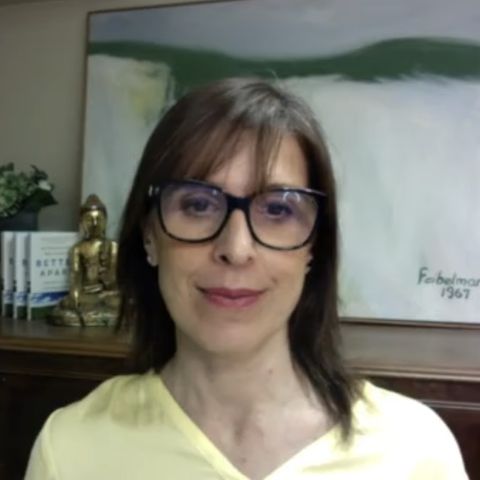Gabrielle Hartley-Resolving the Unsolvable

Scarica e ascolta ovunque
Scarica i tuoi episodi preferiti e goditi l'ascolto, ovunque tu sia! Iscriviti o accedi ora per ascoltare offline.
Descrizione
Gabrielle Hartley has spent over two decades working as a divorce attorney and mediator, but her special sauce is her ability to resolve the unsolvable conflict. Working with polarized individuals,...
mostra di piùWorking with polarized individuals, and families she has learned, first hand that there’s always a productive way forward, even when the situation feels impossible.
She is the Author of Better Apart; The Radically Positive Way to Separate and “The Secret to Getting Along; Three Steps to Life Changing Conflict Resolution.” Both books provide actionable tips to help productively navigate conflict.
Gabrielle's parents divorced and used lawyers and mediators to effectively resolve their divorce and they even created a shared parenting plan, which was cutting edge at that time.
She began her career as a court attorney in New York City, where she helped resolve hundreds of high conflict divorce cases incorporating the problem solving skills she learned both in school and at home. She resolves 99% of her cases at the mediation table and thus is a frequently requested speaker regarding family law, divorce, conflict management, and building a cohesive culture at home and in the workplace.
Gabrielle Hartley, welcome to Justice Counts.
Questions covered in this episode:
Mark: Here on Justice Counts, we typically discuss justice and injustice, here in America and around the world. Many lawyers do not look at divorce in that context, but in my experience, divorce causes injustice to a segment of society that has little or no say in the process. Children are forced to watch the two people they love the most in this world do battle, usually in a hate-filled environment. Then, they are forced to go live with one or the other when they were very comfortable living with both. How do we temper that injustice when we are engaged in a domestic relations battle?
Mark: Do any other obvious issues of justice or injustice come to mind? Are judges typically fair when deciding who gets what in a divorce? Do judges do a deep dive into the situation? Talk to us about this in the context of child custody, support, and division of assets.
Bob: Do courts truly favor the mother, as most of us believe? What is the truth in your experience?
Mark: Michigan is a "no-fault" State. You don't have to have grounds for divorce. Is there a huge difference between a no-fault divorce and one where grounds must be shown?
Bob: In the context of children or extended family like grandparents or aunts and uncles, a divorce breaks up families and extended families, but what causes more injustice, staying with a person you can’t or don’t get along with, or separating from that person?
Mark: I’d like to follow up on that. What steps can a couple take that would limit the impact of divorce to other family members like children, grandparents or aunts, uncles, and cousins?
Mark: I did a bit of a deep dive on you, and I know you advocate for getting along better, even when we disagree. You advocate for staying “positively connected” to your partner or spouse. That’s a great sound bite, but how does it play out for real people in real life situations? What can a couple do to maintain positive connections?
Bob: Can we talk about causes of divorce? Economic issues, political issues, health issues, infidelity or sexual issues, child-rearing or discipline issues, division of labor or responsibility issues come to mind, but what is the number one cause of divorce and how do we prevent it before it happens?
Bob: You’ve been a divorce attorney for a long time. What is the strangest reason for a divorce you’ve come across?
Mark: Talk to us about mediation as a more sensible and less combative means to resolving a divorce than participating in a full-blown trial.
Mark: Again, in my deep dive, I discovered that this has played out in your own life with your own parents. If your comfortable doing so, please tell our audience about your own personal experience. How did that shape your views about divorce, and your life and choices moving forward from the divorce?
Bob: You have advocated for what you call the “Yes method.” How does that play out in real relationships?
Mark: You suggest in your Ted Talk that couples should prioritize peace. In other words, would you rather be right and lose someone you love or disagree and still maintain the relationship? Can you elaborate?
Bob: Tell us about your two books. Who were they written for and what are some of the important messages?
Bob: Where can folks find the books?
Informazioni
| Autore | Mark M. Bello |
| Organizzazione | Mark M. Bello |
| Sito | - |
| Tag |
Copyright 2024 - Spreaker Inc. an iHeartMedia Company

Commenti